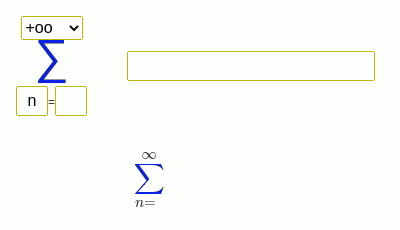Sum of series ((-1)^n)*((x^n)/(2n*n!))
A solução
You have entered
[src]
oo ____ \ ` \ n \ n x / (-1) *------ / 2*n*n! /___, n = 1
$$\sum_{n=1}^{\infty} \left(-1\right)^{n} \frac{x^{n}}{2 n n!}$$
Sum((-1)^n*(x^n/(((2*n)*factorial(n)))), (n, 1, oo))
The radius of convergence of the power series
Given number:
$$\left(-1\right)^{n} \frac{x^{n}}{2 n n!}$$
It is a series of species
$$a_{n} \left(c x - x_{0}\right)^{d n}$$
- power series.
The radius of convergence of a power series can be calculated by the formula:
$$R^{d} = \frac{x_{0} + \lim_{n \to \infty} \left|{\frac{a_{n}}{a_{n + 1}}}\right|}{c}$$
In this case
$$a_{n} = \frac{\left(-1\right)^{n}}{2 n n!}$$
and
$$x_{0} = 0$$
,
$$d = 1$$
,
$$c = 1$$
then
$$R = \lim_{n \to \infty}\left(\frac{\left(n + 1\right) \left|{\frac{\left(n + 1\right)!}{n!}}\right|}{n}\right)$$
Let's take the limit
we find
$$R = \infty$$
$$\left(-1\right)^{n} \frac{x^{n}}{2 n n!}$$
It is a series of species
$$a_{n} \left(c x - x_{0}\right)^{d n}$$
- power series.
The radius of convergence of a power series can be calculated by the formula:
$$R^{d} = \frac{x_{0} + \lim_{n \to \infty} \left|{\frac{a_{n}}{a_{n + 1}}}\right|}{c}$$
In this case
$$a_{n} = \frac{\left(-1\right)^{n}}{2 n n!}$$
and
$$x_{0} = 0$$
,
$$d = 1$$
,
$$c = 1$$
then
$$R = \lim_{n \to \infty}\left(\frac{\left(n + 1\right) \left|{\frac{\left(n + 1\right)!}{n!}}\right|}{n}\right)$$
Let's take the limit
we find
$$R = \infty$$
The answer
[src]
/ / pi*I\ / pi*I\\
|EulerGamma - log\x*e / + Ei\x*e /|
-x*|---------- - ----------------------------|
\ x x /
-----------------------------------------------
2
$$- \frac{x \left(- \frac{- \log{\left(x e^{i \pi} \right)} + \operatorname{Ei}{\left(x e^{i \pi} \right)}}{x} + \frac{\gamma}{x}\right)}{2}$$
-x*(EulerGamma/x - (-log(x*exp_polar(pi*i)) + Ei(x*exp_polar(pi*i)))/x)/2

Examples of finding the sum of a series
- The Sum of the Power Series
x^n/n
(x-1)^n
- Factorial
1/2^(n!)
n^2/n!
x^n/n!
k!/(n!*(n+k)!)
- Flint Hills Series
csc(n)^2/n^3
- Basel problem
1/n^2
1/n^4
1/n^6
- Harmonic series
1/n
- Grandi's series
(-1)^n
- Alternating series
(-1)^(n + 1)/n
(n + 2)*(-1)^(n - 1)
(3*n - 1)/(-5)^n
(-1)^(n - 1)*n/(6*n - 5)
- Newton–Mercator series
(-1)^(n + 1)/n*x^n
- Exam the series for convergence
(3*n - 1)/(-5)^n

 n^(1/n)
n^(1/n)
 5^n
5^n
 2(1/(n^2+5n+6))
2(1/(n^2+5n+6))